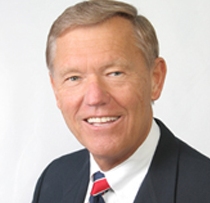ABOUT
TOPICS
TESTIMONIALS
About Dr. Barry Asmus
Dr. Barry Asmus is a Senior Economist with the National Center for Policy Analysis. Dr. Asmus has been named by USA Today as one of the five most requested speakers in the United States. Over the last twenty-five years, Dr. Asmus has spoken to thousands of companies and associations throughout the United States. He has testified before the House Ways and Means Committee regarding our income tax system and was a featured speaker in a privatizing Social Security conference for Western European leaders. On recent trips to Romania, Albania, China and Peru, Dr. Asmus has encouraged government leaders to pass free-market, low tax, protected property rights and free trade policies.
Dr. Asmus is the author of nine books. His book, Crossroads: The Great American Experiment was nominated for a H.L. Mencken Award. As a Professor of Economics, he was twice voted University Professor of the Year and was honored with the Freedom Foundation Award at Valley Forge for Private Enterprise Education. He co-anchored a syndicated radio called “Perspectives on the Economy.” Dr. Asmus is an effective advocate of free market economics. He is a recognized thinker who delivers his ideas in an enthusiastic and energy filled presentation.
America’s Economic Future: The Six Unstoppable Trends
Dr. Asmus identifies the “Six Unstoppable Trends” that are impacting America’s business and its economy. The current recession will temporarily slow these trends but not stop them. The Latin word for credit is credere which means “to believe.” The deleveraging and economic contraction began in 2008 and could last until 2010. But note this: we have had 13 economic recessions in the last 80 years followed by 13 expansions. Currently, 75 million Baby Boomers are in the high investment and most productive stages of their lives. Confidence will be restored. The end of prosperity or the best is yet to come? Dr. Asmus’ presents his “Six Unstoppable Trends” and asks you to decide.
Globalization: International Prosperity & Its Impact on America
The opportunities embedded in entrepreneurial capitalism, a growing population and a rapidly globalized world are stunning. As the Internet continues to transform the world, making the planet the relevant market and connecting everyone as both producers and consumers, the role of emerging countries will be something to celebrate. And, because drivers like freedom, prosperity and technology produce such transforming outcomes, the question is how to harness the power of those incentives. The world will once again move forward after a very painful backward step.
Freedom: Still America’s Best Investment
The most vital force of our country has been freedom. Freedom unleashes more energy and genius than any alternative. America, the biggest island of freedom in the world, has always been the place people run to when, in hope or hopelessness, they are running from somewhere else. When freedom proceeds, prosperity follows. When freedom leads, the mutually beneficial exchange of capitalism moves nation’s forward. Dr. Asmus makes a compelling case for why America produces nearly a third of the world’s wealth, most of the world’s Nobel Laureates and a majority of the world’s inventions with less than 5 percent of the world’s population. Democratic capitalism and freedom are still the best hope for mankind.
Healing Health Care in America
How much would you buy if you went shopping with someone else’s credit card? Yet, this is how today’s health care system works. We are spending everyone’s money except our own. Is it sustainable? No. Can we do something about it? Yes. Health Savings Accounts create the necessary incentives for a competitive health care system. A high deductible catastrophic insurance plan would cover the high costs, while an individual health saving account would cover all the smaller charges. Reforming Medicare and Medicaid reimbursements would also allow hospitals to overcome the governmental mandate of free health care, currently at $30 billion annually. Tort reform and limitations on medical liability are necessary to slow down the practice of defensive medicine. Widespread use of electronic medical record keeping is imperative for cost and quality control. Dr. Asmus’ presentation offers real world solutions to run-away health care costs.
Powering America’s Energy Future
As a Senior Economist with the National Center for Policy Analysis, Dr. Asmus has argued for removing laws that restrict the development of domestic energy supplies. By 2020, Asmus estimates that America will consume 125 quads of energy, a 25 percent shortfall from the current supply. France doubled its energy independence by building 57 nuclear power reactors in the last 30 years. The U.S. should do the same. By drilling in Alaska, in America’s Outer Continental Shelf, in the Gulf of Mexico, and in states that have huge deposits of shale and coal our dependence on foreign oil would fall dramatically, as would energy prices. Both wind and solar energy will be helpful in the long term, but they are only intermittent sources of future power. Do we want more oil, gas, and electricity or more regulation, taxes, and dependence? The choice is ours.
Testimonials
“What can I say but WOW. You were on fire. You owned the audience. Of our hundreds of events, this one was the most successful mainly because of you. Thanks again, Barry.”
– Tom Crawford, Chairman, CEO, Leadership Network Corporation
“I was deeply moved by your Tribute to America. Listening to your thoughts on the worldwide movement to titles and property rights was encouraging.”
– Hernando de Soto, President of Institute for Liberty and Democracy, Lima, Peru
“Your presentation went beyond great–it was interesting, provocative, funny, energizing and very warm. Thanks.”
– Karen Sinchak, President, Sinchak and Associates
“Your presentation provoked more thoughts and emotions than I have the comprehension or typing skills to properly convey. Your plain English and true to life illustration of economic cause and effect was tremendous.”
– Frank Stone, Sr. Vice President, Smith Barney

